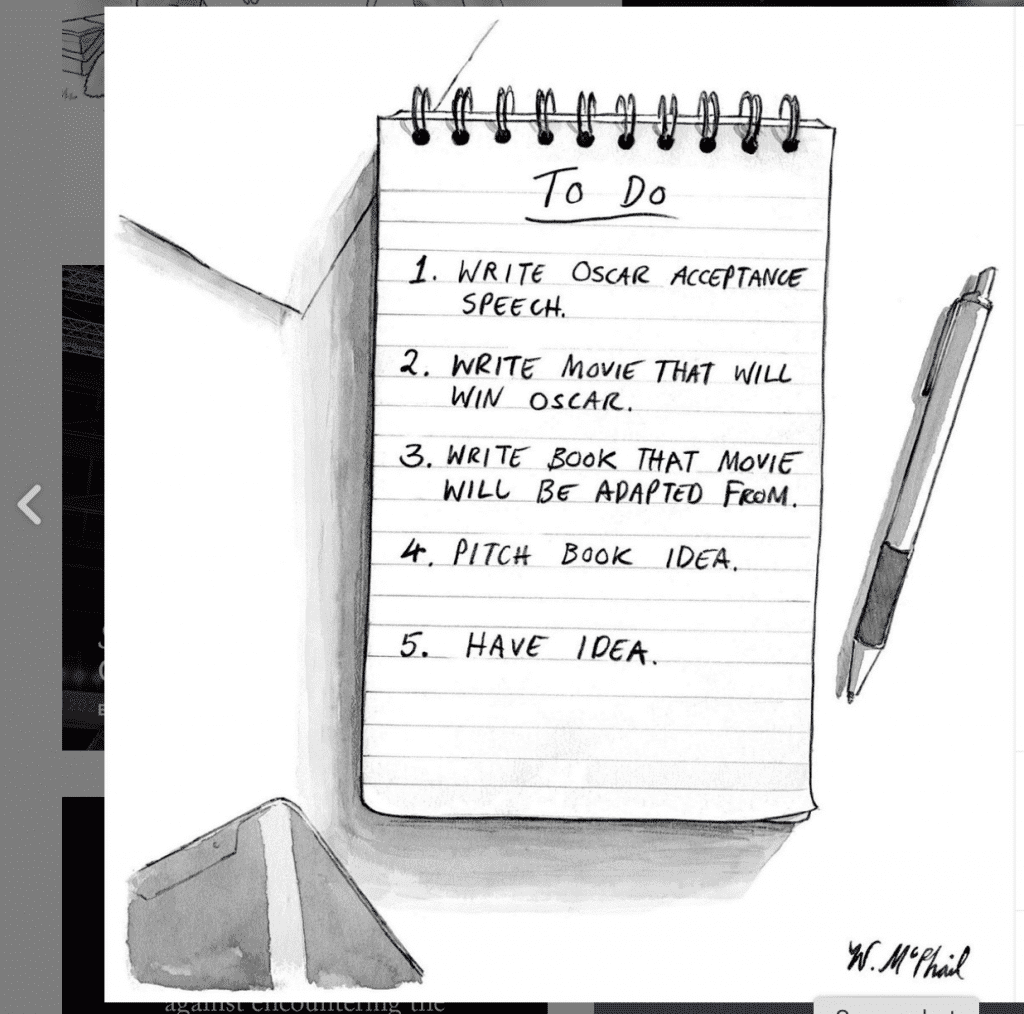On Friday, The New Yorker Magazine shared a ‘To Do List’ on their Instagram page. It went viral. Take a look:
1. Write Oscar acceptance speech
2. Write movie that will win Oscar
3. Write book that movie will be adapted from
4.Pitch book idea
5. Have idea

You have to start somewhere, read the caption. Wouldn’t you agree?
You have big dreams. Sometimes, they sound insurmountable to your own ears. But if you have had that thought nagging your being, the chances are, it is well within your reach. So, get up and become a new person overnight, right? Nah! Might not work.
All big changes start with a small step. A step after step after step is a goal achieved. If you are looking at building a new habit or changing an existing one, a drastic overhaul is rarely sustainable. Science agrees. Consistently exercised incremental changes are crucial to sticking to new routines and habits.
A few moons ago, I discovered an effective structured approach to moulding behaviour and life! It’s called the Kaizen method. You have probably heard about it in the business philosophy context. Sarah Harvey’s book, Kaizen: The Japanese Method for Transforming Habits One Small Step at a Time, lays down the principle in detail. She offers scenarios where you could apply the Kaizen method for transformative results for personal growth.
Harvey calls it the ‘good change’. The Kaizen method is about taking tiny steps towards your big change. ‘Tiny’ is the operative word. I have already applied it to cut back the sugar in my tea successfully. If you are a chai lover, you know how fixated one can get about the right amount of sugar and the right colour.
Here’s the Kaizen way: Bring about the change 1/4th at a time. So, If I were consuming 2 spoonfuls, I’d take 1/4th less for a week. The following week, reduce by another 1/4th. So in the second week, I am taking one and a half spoonful. And so on. Why does it work? Because the change is so tiny, the brain doesn’t even notice. No craving, no falling back into the sweet trap. And then, I have built a routine, which will become a habit soon.
Harvey has offered the Kaizen approach for various aspects of life: health, work, home, relationships, habits, and challenges. The sections are further divided, replete with practical scenarios.
And here’s the thing, in the beginning, everyone is flushed with enthusiasm. Gradually, it wears down. In those times, remind yourself of why you started in the first place. Make yourself see how awesome you will feel in the end; the difference it will make to your life. Celebrate small victories. Share with people who will motivate you to reach the finish line (like I have you to share my joy). Have a circle of cheerleaders to encourage you to go further.
This is not the first self-help book I read, and it won’t be the last. In fact, I have access to the best guru’s wisdom (just like you all) through os.me that can shape the mind, body, and soul. Well then, bracing myself for a more awesome version of myself 🙂
Have dreams. Will achieve. Break it down into steps. Start somewhere. As Swamiji would say, resist resistance. Just start. There, you have your Oscar-winning project in your kitty. Keep going.
And here’s a quick weekly round-up of tested ideas to ensure you create a meaningful life. Lots of learning in these personal stories.
Wisdom from Swamiji
The Daffodil Principle to help create your own garden of full-blown beauty + Other transformative pieces tell a friendThe Daffodil Principle: Wabi Sabi — a Japanese concept that reminds us to flow gracefully with the transient and imperfect life. But how? Swamiji breaks down the Daffodil Principle with a beautiful story. Create your own garden of full-blown beauty. (Japanese philosophy is the highlight of the week, perhaps).
How Do You Know What You Know?: Pablo Valle learnt a vital lesson when teaching English in, ahem, Japan. We judge, stereotype, and assume based on our conditioning. Limiting our own growth. Read Swamiji’s invaluable wisdom on “these rocks of opinions” that distort the “view of reality”. Don’t let them hinder your growth.
Transformative Experiences
Q&A With Swamiji: Did Swamiji have any “romantic interlude”? Why did he sell his Porsche? Why did he go to Australia? All answers in this fifth part of the series that Hritvik Chaturvedi (@hritvik)is running. He is transcribing Swamiji’s teachings for the greater good. Answers to questions about sankalp, self-realisation, hurt caused by others, and more are to be found in the series.
The Priest and the Amusement Park: A king wanted to pick up a suitable heir. So what did he do? Designed the most amazing amusement park. The amusement park is a metaphor for the world. If you want to be that heir apparent, read Dipali Patnaik’s (@dip) short story pregnant with meaning and wisdom.
Lessons on This Path: This world is not here to make you happy. It is here to make you conscious. If only I remembered this every time I felt disappointed by the people who inhabit it. Neena (@Neena) lists many essential lessons to help stay the course.
Sparkle Thy Memory: Speaking of remembering, here is a useful mnemonic trick to memorize dates. Never forget your anniversary again, or Gandhiji’s janamdin, thanks to Suchali Lotlikar (@suchali).
The Power of Thoughts: That hunch that mom has when you are in a soup… Or intuitively knowing about someone’s mental state… We have called it the sixth sense. Science calls it Quantum Entanglement. Hargun Singh (@Hargun) illustrates that vibes or wavelengths can change the world, choose yours carefully.
The Stranger in the Cold: This is a heart-warming personal story. On a cold night, Danielle Om Der Bedrossian Wells (@Dany) and her husband brought warmth to a stranger’s life. This is how you make the world better, one random act of kindness at a time.
Life Lessons: This is a story that you have heard several times over. Pawan Tikar’s (@AIR) retelling contemporaries it. If you ever feel beaten, think of the protagonist of this story.
The Little Prince: This is a deeply personal ode to friendship. Nandita Basu (@That) writes about a friend she lost 20 years ago. Until her last moment, she brimmed with life and hope. And the two were lucky to have each other. Nandita, you are a true friend.
Here is a useful mnemonic trick to memorize dates + Other transformative pieces tell a friendWatch This Now!
A reminder of hope, that Saturday that Lina wrote about is two days away. Happy reading & writing. Stay OSME!
Until next…








Comments & Discussion
51 COMMENTS
Please login to read members' comments and participate in the discussion.